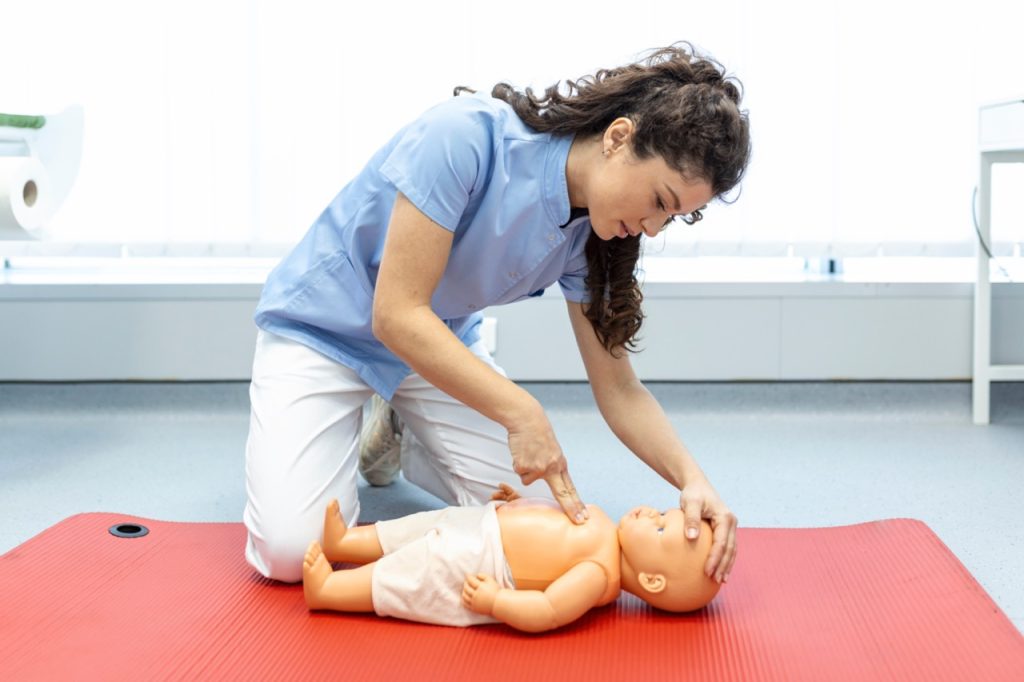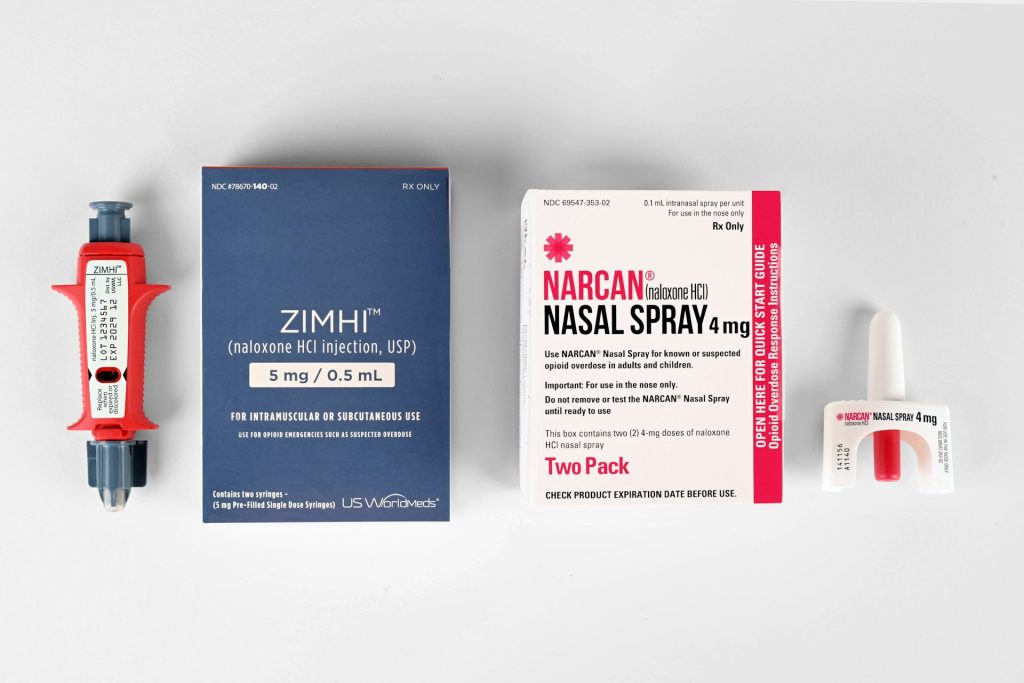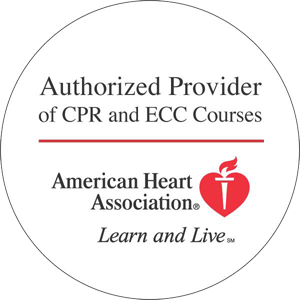Cardiopulmonary resuscitation (CPR) is one of the most basic techniques to save a life that so many people in the world don’t know or aren’t comfortable using—and when someone does know how to utilize it, they might get caught up on the correct method for certain age groups. Knowing the proper method for CPR for every age might make you a little more comfortable if you ever need to use the life-saving technique. Today, we’re here to compare CPR methods for infants, children, and adults so that when you’re in an emergency, you’ll have confidence that you’ll know what to do. Even that extra moment of confidence can mean you save someone’s life.

When to Use CPR
First things first, how do you know when to use CPR? Generally, CPR is appropriate for anyone of any age who is:
- Unconscious and experiencing irregular breathing
- Suffering from a heart attack
- Pulled from the water after nearly drowning
- Choking, gasping, or can’t breathe
Why is CPR Necessary?
CPR is a life-saving technique meant to keep blood pumping until help arrives. Without CPR, a person can’t get oxygen and their blood stops pumping. This leads to brain damage in just a few minutes followed by more severe consequences.
Before Starting CPR
Before starting CPR, ensure that the environment is safe for the person, determine whether they are unconscious by tapping or shaking them and loudly asking if they’re okay, and call 911 if you’re alone or have someone else call if you’re not.
Types of Life-Saving CPR Methods
While CPR has a similar outcome in infants, children, and adults, the process differs greatly depending on the age range of the person. The younger a person is, the more delicate the procedure needs to be to ensure no irreparable damage is done—all while having enough force to get the blood pumping and keep the person alive.
Here’s how to differentiate between age groups:
- Infant: Generally 1 year of age or younger—a baby.
- Child: Older than 1 but has not yet reached puberty.
- Adult: Has shown signs of puberty.
CPR Methods for Infants
Step 1 — Complete 30 Chest Compressions to Restore Blood Flow
For infant CPR, the baby should be placed on their back on a firm, flat surface. Then:
- Stand or kneel at the side of the baby with your hips at an angle
- Give 30 compressions with both thumbs side by side in the center of the chest, just below the nipple line, using your other fingers to support their sides and back
- Push down hard and fast 1 ½ to 2 inches deep (around 100 to 120 per minute)
- Let the chest return to normal after each compression
Step 2 — Give 2 Rescue Breaths to Open the Airway
Complete the head-tilt, chin-lift maneuver and open the airway by lifting the baby’s head and chin upward, to a neutral position. Then:
- Blow into baby’s mouth for 1 second
- Ensure each breath is making their chest rise
- Let the air exit before giving another breath
- If the breath doesn’t make their chest rise, reposition the head and ensure mouth positioning has a tight seal
- Complete a second breath
- If neither breaths make the chest rise, there could be an obstruction in the airway
Step 3 — Repeat Compression and Breaths
Continue 30 compression breaths and 2 breaths until:
- Signs of life are restored
- An AED is ready to be used
- A medical responder takes over
- The scene is deemed unsafe
- You’re too tired to continue
- You’ve done CPR for two minutes, you’re alone, and need to call 911 still
CPR Methods for Children
Step 1 — Complete 30 Chest Compressions to Restore Blood Flow
For child CPR, they should be placed on their back on a firm, flat surface. Then:
- Kneel at the side of the child
- Place the heel of one hand at the center of the child’s chest and place your other hand over the top with your fingers interlaced
- Note: For small children, you can use a one-handed CPR technique if less pressure is needed
- Push down hard and fast 2 inches deep at a rate of 100 to 120 compressions per minute
- Let the chest return to normal after each compression
- Give 30 compressions
Step 2 — Give 2 Rescue Breaths to Open the Airway
Complete the head-tilt, chin-lift maneuver and open the airway by lifting their head and chin upward, to a slightly past-neutral position. Then:
-
- Blow into child’s mouth for 1 second
- Ensure each breath is making their chest rise
- Let the air exit before giving another breath
- Blow into child’s mouth for 1 second
- Note: For young babies, you can also do breaths over both their nose and mouth
- If the breath doesn’t make their chest rise, reposition the head and ensure mouth positioning has a tight seal
- Complete a second breath
- If neither breaths make the chest rise, there could be an obstruction in the airway
Step 3 — Repeat Compression and Breaths
Continue 30 compression breaths and 2 breaths until:
- Signs of life are restored
- An AED is ready to be used
- A medical responder takes over
- The scene is deemed unsafe
- You’ve done CPR for two minutes, you’re alone, and need to call 911 still
CPR Methods for Adults
Step 1 — Complete 30 Chest Compressions to Restore Blood Flow
For adult CPR, lay the person on their back on a firm surface. Then:
- Place the lower palm of your hand over the chest, between the nipples, and place your other hand on top with your elbows straight
- Give 30 hard and fast compressions to a depth of 2 inches but no more than 2.4 inches at 100 to 120 compressions per minute
- Put your entire weight into the compressions
Step 2 — Give 2 Rescue Breaths to Open the Airway
- Lift the head using the head-tilt, chin-lift maneuver to open the person’s airways
- Give breaths mouth-to-mouth (unless the mouth is injured, then do mouth-to-nose)
- Pinch the nostrils shut and seal their mouth with your own
- Give a one-second breath and check if the chest rises
- If the chest doesn’t rise, reposition the head or check for obstructions
- Give a second 1-second breath
Step 3 — Repeat Compression and Breaths
Continue 30 compression breaths and 2 breaths until:
- Signs of life are restored
- An AED is ready to be used
- A medical responder takes over
- The scene is deemed unsafe
- You’ve done CPR for two minutes, you’re alone, and need to call 911 still
Comparison Between Infant, Child, and Adult CPR
The main comparison between infant, child, and adult CPR is that different hand positions, pressures, and mouth-to-mouth alignments will be used depending on the person’s age. You don’t want to use too much force with fragile infant bodies whereas you’ll need a lot of force for adults to compress properly to get the job done. If you have any questions about the process, contact our team at HeartCert to find out more information.
Tricks to Remember CPR Tips
- Do compressions to the beat of the song, “Stayin’ Alive”
- Spell CAB (Compressions, Airway, Breathing) to remember the CPR order
- Place the person on a hard surface so the compressions have more effect; a pliable surface won’t make the same impact
- Complete chest compressions and breathing for 2 minutes before calling 911 if you’re alone and you haven’t already
CPR Can Save Lives
CPS can quite literally save lives—and you have the opportunity to save someone in an emergency. All you have to do is get your certification to know the steps like a pro, and you’ll be on your way to changing lives for the better. You have the potential to save anyone from any age in an emergency. Are you ready to sign up for a course and get your CPR certification today?
HeartCert is your trusted training partner for CPR, ACLS, PALS, EMR, First Aid, CNA, IV, EKG and more, throughout the United States.
Courses include CPR/AED/First Aid, Basic Life Support (BLS), Advanced Cardiac Life Support (ACLS), Pediatric Advanced Life Support (PALS), Certified Nursing Assistant training, IV training, EKG training, babysitter basics and more. Courses and certifications from both the American Heart Association and American Red Cross are available. We offer virtual courses and certifications, in all 50 states as well as in-person classes at our headquarters, HeartCert CPR Eagan and major cities in Iowa, Illinois, Georgia, Michigan, Minnesota, Mississippi, Nebraska, Pennsylvania, Texas and Wisconsin.









